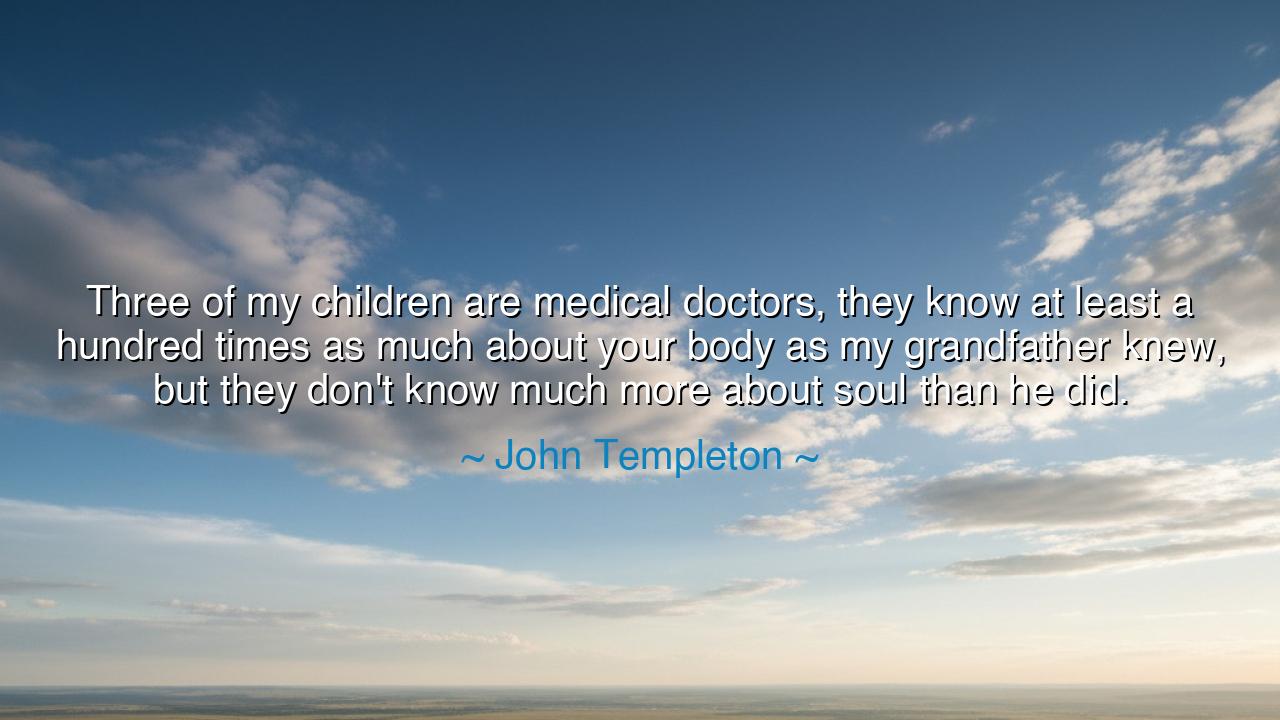
Three of my children are medical doctors, they know at least a
Three of my children are medical doctors, they know at least a hundred times as much about your body as my grandfather knew, but they don't know much more about soul than he did.






In the words of John Templeton, "Three of my children are medical doctors, they know at least a hundred times as much about your body as my grandfather knew, but they don't know much more about soul than he did." These words resonate with a deep and ancient truth: while the advancement of knowledge in the material world has soared to unprecedented heights, the understanding of the soul—that eternal, intangible essence of who we are—remains largely uncharted. Templeton’s insight calls upon us to reflect on the imbalance that often arises between our mastery over the physical world and our neglect of the spiritual dimensions of existence.
In the days of the ancient philosophers, the body and the soul were inseparable, two halves of the same whole. Socrates famously said, "The unexamined life is not worth living," recognizing that true wisdom comes from the pursuit of understanding not just the physical world, but the very essence of the self. In those times, the physician was not merely a healer of the body, but a guide to the soul. The ancient Greeks believed in the harmonious balance of mind, body, and soul, understanding that true health was not achieved through the mere treatment of the body, but through nurturing the spirit as well.
Consider the example of Hippocrates, often hailed as the father of modern medicine. Hippocrates recognized that healing was not just about the physical ailments of the body but about the balance of the inner life. His teachings emphasized that the emotional and spiritual well-being of a person was just as critical to their physical recovery as any medicine or treatment. Yet, even in his time, there were limitations to what could be understood about the soul. Though great strides were made in medicine, the ancient world could not yet explain the depth of the human spirit or offer cures for the invisible wounds that reside within.
As Templeton’s reflection suggests, despite the remarkable advancements of modern medicine, there remains a vast chasm between our knowledge of the physical world and our understanding of the soul. Today’s medical doctors may know more about the body than any of their predecessors, but they are often equipped with little guidance when it comes to the emotional, psychological, or spiritual needs of their patients. While doctors may excel at diagnosing and treating ailments of the body, the deep questions of purpose, meaning, and inner peace often remain outside the scope of their expertise. And yet, the pursuit of these questions—the understanding of the soul—remains as essential to the human experience as any physical healing.
This disconnection between the physical and spiritual realms is echoed in the teachings of the ancient Eastern traditions. The Buddha, for example, spoke of the importance of cultivating inner peace and wisdom, emphasizing that true healing comes from understanding the mind and the soul. In Hinduism, the pursuit of knowledge about the soul, or atman, is seen as the highest path to enlightenment. In both traditions, healing is not limited to the body but extends to the mind and spirit. This ancient wisdom reminds us that our well-being is not defined solely by our physical health but by our ability to nurture the soul and achieve harmony within.
Templeton’s quote also calls us to reflect on the nature of progress itself. While we celebrate the tremendous achievements of science and medicine, we must ask: Have we advanced in understanding the true nature of human flourishing? The lesson here is profound: our knowledge of the body may increase a hundredfold, but without an equal emphasis on understanding the soul, we risk living lives that are outwardly healthy but spiritually impoverished. Just as the ancients sought balance in all things, we too must find a way to honor both the body and the soul in our quest for health and happiness.
As we journey through life, let us remember that healing the body is only part of the equation. True wellness requires us to attend to the soul—to nourish it with purpose, love, and meaning. We must cultivate practices that support both our physical and spiritual health, just as the ancients taught us. Whether through meditation, reflection, community, or the pursuit of knowledge, we must seek to understand and nurture the very essence of who we are. In doing so, we align ourselves with the wisdom of those who came before us, ensuring that we live not just with a healthy body, but with a soul that is whole, balanced, and at peace.






AAdministratorAdministrator
Welcome, honored guests. Please leave a comment, we will respond soon